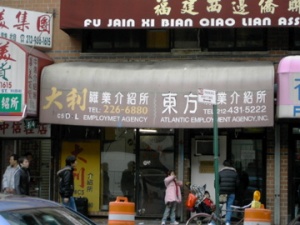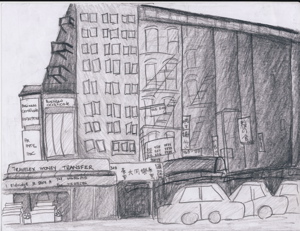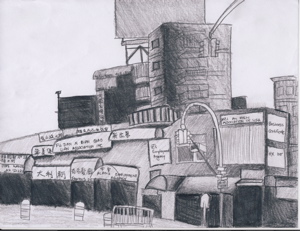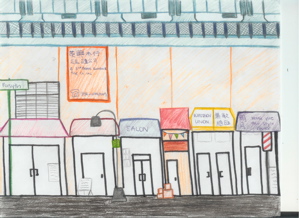Employment Agencies
From East Broadway, Chinatown
Contents |
Introduction
Employment agencies, in general, are businesses that match workers to available jobs. Specifically for Chinese immigrants, these employment agencies are an integral and essential phase in the process of assimilating and succeeding in America. Coming from China, these immigrants are usually not completely aware or comprehend American business, jobs, currency, and basic way of life; therefore, these agencies are one aspect that aid such development and learning.
Definition
In Chinatown’s many employment agencies, scattered on every few blocks, such as on East Broadway or Eldridge Street, the customers never seem to dissipate or fade because of the persistent need for jobs and money. Yet clearly, the reasons for earning money can range from the burden of paying back smuggling fees to the snakeheads, sending remittances back home to China, or simply earning to live more comfortably in America. Either way, these employment agencies, though so many in numbers, do not worry too much about competition with other agencies because it seems that there are enough customers to go around. For example, on Division Street, the Sincere Employment Agency is only separated by two store fronts from another agency, 88 Employment Agency Inc yet there seems to always be a considerate good flow of customers from both.
Of course, though different employment agencies might have slight variations between how they run their business, there are distinct and specific characteristics that exist within all. The strength of employment agencies: quick and efficient. The principal and most important reason for the success is simply because jobs are found right on the spot with immediate feedback and hiring. The immigrants speak with the clerk in the employment agencies in the Fuzhounese dialect and sometimes Mandarin, then they are interviewed by the restaurant owner over the phone. If accepted, the job seeker would pay the clerk $20-$40 for a successful match and would board the bus for the job. The employment agencies are also closely interwoven with bus organizations that would help the immigrants get to their new job. They are all co-dependent within each other. For the bus companies, they are always available waiting buses lined up on the side of the streets, almost always evident in the Eldridge-Division-Forsyth block. This extensive transportation network is established throughout Chinatown and the United States.
For many of the agencies that are not legalized businesses without the proper licenses or certificates, usually lack English signs so that they can be hidden from non-Chinese speakers or other possible conflicts like authorities. Though this can sometimes cause difficulty and trouble for the agencies, they are well aware of its importance, and find ways to continue with their business. Without such help of finding employment, much of the Chinese community that has been built and growing since the early 1900’s, when the first several waves of Chinese immigrants came to the “Big Apple,” would not be so extensive or matured without the help of facilitating businesses such as employment agencies. In result, the significance and the role of such agencies are so critical to understand within the Chinese culture.
Fieldwork
Mapping
Observations
To better understand the culture and dynamics of employment agencies, we ventured into the source of employment for Fuzhounese immigrants: Eldridge St and Forsyt St. One key observation to note amongst the dozens of agencies is the lack of English signs. Without English signs, employment agencies owners ensure that this type of organization remains hidden from non-speaking authorities. Many of the employment agencies we went into did not have a certificate that legalizes their organization, which is also partly why there are a lack of English signs. Depending on the day of the week, employment agencies can be either very busy or completely empty. The beginning of the week usually starts off slow, with very little clients on Monday. By Thursday, people are lined up outside the employment agencies, frantically searching for a job and to board by Friday or Saturday evening.
We tried asking both employment agencies workers and those that are looking for a job to share their experience with us. Their responses are included in the interview section. Not all the responses we received were positive; in fact only Wendy, who recognized us from our visit with Professor Guest, was willing to offer any sort of response.
Interviews
Interview One:
Q- How many years have you been an employment agent?
A- Over ten years.
Q- What made you want to do this job?
A- For the money.
Q- How were you able to secure your connections with the employers?
A- I applied for a license with the government so I can be a legal employment agent, then I registered with other companies and gave employers my contact information. Employers need people and I would publicize myself in newspapers and employers would contact me.
Q- About how many people come in here a day looking for a job?
A- It depends what day of the week it is. If it is Monday, very little, if it is Thurday, a lot.
Q- What type of immigrants usually use employment agencies to find a job?
A- Fuzhounese people.
Q- Where did you used to work before this?
A- In a factory.
Interview Two:
Q- Hi, we are college students studying employment agencies and it’s role to the Fuzhounese immigrants in Chinatown. Do you mind if we ask you some questions?
A- If I don’t have any customers, sure.
[Empty room]
Q- How many years have you been an employment agent?
A- I don’t want to answer that…[pause] I have customers now.
[Empty room]
Interview Three:
Q- Hi, we are college students studying employment agencies and it’s role to the Fuzhounese immigrants in Chinatown. Do you mind if we ask you some questions?
A- There’s nothing going on here.
Ethnic enclave
To be able to understand employment agencies we cannot ignore the ethnic enclave that has formed in Chinatown. Ethnic enclaves are formations of ethnic communities. It is not just a term used to describe the spatial location, but rather the system in which enterprises are owned and run by these specific immigrant groups. These require social and economic capitals to start up the businesses, along with an extensive division of labor to run the businesses. Ideally these enclaves are present to help new immigrants assimilate to their new environment, however, immigrants live, work, and socialize without ever leaving the enclave and in most cases are easily exposed to exploitations.
Chinatown is a strong and still growing ethnic enclave with its latest wave of Fuzhounese immigrants who are most vulnerable to co-ethnic exploitation. Most of these immigrants have been illegally smuggled in by Chinese gang members known as “Snakeheads”. Currently they charge $75,000, because the demand for immigration has increased, as compared to $30,000 just ten years ago. Neither the immigrant nor their families can pay this upfront, so they make deals with the smugglers to pay them back with interests. The Snakeheads would often threaten the immigrants and their families until the debt is fully repaid. In his book, Forbidden Workers: Illegal Chinese Immigrants and American Labor, Peter Kwong says, “these days, smugglers insist on the full payment before releasing the illegals. They prefer to shift the responsibility of keeping track of the debt payments to other enforcement parties, be they relatives, local gangs, local loan sharks or village associations” (81). But even family members can be as bad as these Snakeheads, constantly demanding their money back with high interests. So these new immigrants willingly accept any working conditions to be able to pay off their debts and open themselves to exploitation by the ethnic Chinese enclave. So unlike the earlier generations of ethnic enclaves, these have created indentured servitude conditions rather than acting as a stepping-stone to upward mobility.
Chinatown’s enclave has become a trap for the Fuzhounese. Even with the knowledge of these exploitations, people back in Fuzhou are still eager to come. “When I confronted the relatives of illegals in China with accounts of torture, kidnapping, rape, and other abuses perpetrated by the snakeheads, they usually responded that the snakeheads have every right to punish those who are lazy and unwilling to pay off their debts. In a way, the snakeheads have already immunized the Fuzhounese from being critical of the human smuggling process” (Kwong, 96). The Fuzhounese back in China dream that they will be able to pay off their debts within two years and be able to open up their own business after that. They are willing to work for the enclave because it is their only social capital that might lead to economic capital.
The Fuzhounese at this point are the rock bottom of the economic ladder and for them to be able to move upwards, they need to accumulate enough capital and cheap labor. Often they would try to pool money together between families, and if they were lucky enough to open their own businesses, they would then have to divide profits and repay the loans. Therefore, in order to survive, they are willing to exploit their own people for their own good. “Employment within the ethnic economy places the worker within an even more exploited position in the subordinate segment of the working class” (Hirabayashi 55).
After years and years of working within this indentured servitude system, many still cannot leave and will not leave even if they had an opportunity to. The Snakeheads threaten to kill anyone who should go and report them to the government, but the fear of these Snakeheads are not as strong as the fear of deportation. Many immigrants will try again and again despite their failed attempts to get smuggled in, so to be deported back to China after so many years here would be frowned upon, and looked as bringing shame to the family. They would be referred to as “mei-zu-shi, useless and lacking in ambition” (Kwong 96).
Significance/Role
As evident, employment agencies equal jobs, which then equals money. These agencies foster the possibility to connect with jobs outside the city, even outside the state, which is an extremely common occurrence for many immigrants who once again, facilitate the bus transportation to do so. Most importantly through the help of employment agencies, the usually difficult networking ties from worker to employer are made with a simple telephone call. No research or even physically locating which businesses have availabilities is not needed at all. The great significance is hence in its simplicity. Even more, the role of employment agencies within this close-knit Chinese community, we call Chinatown, has formed an ethnic enclave in itself.
Pictures
Bibilography
Kwong, Peter. Forbidden Workers: Illegal Chinese Immigrants and American Labor. New York: The New Press, 1997.
Hirabayashi, Lane Ryo. Teaching Asian America: Diversity and the Problem of Community. Rowman & Littlefield, 1998.




